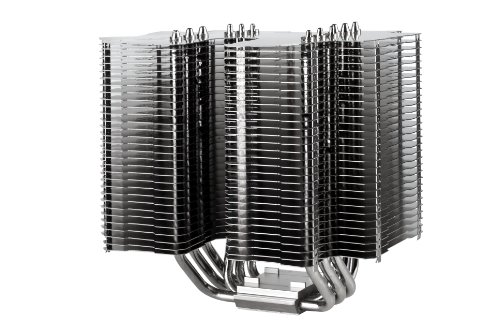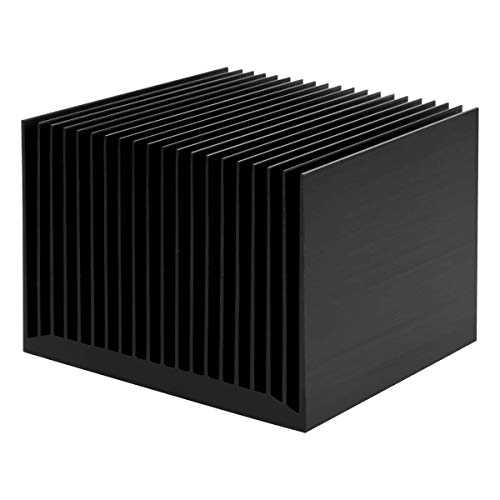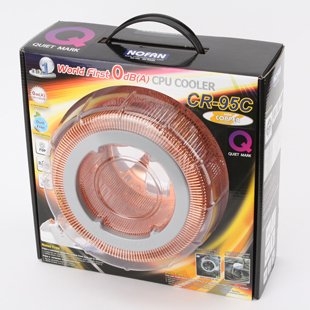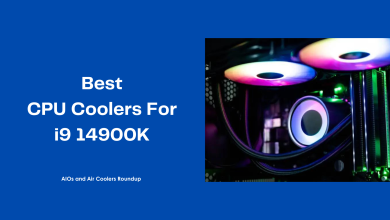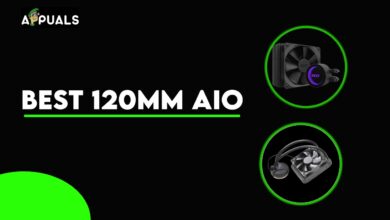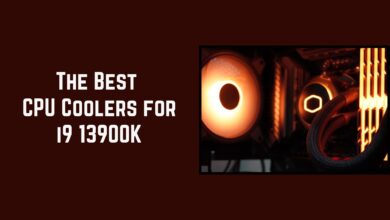4 Best Passive Air Coolers For Your Silent PC Build
Not a lot of people care for or are even aware of passive coolers for their processors. In fact, this entire subject might be entirely foreign even to some PC veterans and enthusiasts. The concept is quite similar, as the name itself implies. Passive air coolers don’t use a fan, instead, they entirely rely on the heatsink and heat pipes. It’s what you might call a fanless air cooler. For most people, it’s more practical just to go with a standard air cooler. However, there is a market for these products, and that’s why you’re reading this.
Passive coolers produce low noise level due to the utter lack of a fan. For people who want to build Silent PCs, this is completely ideal. They are also low maintenance and require little to no cleaning. These coolers don’t use any power either, which means you don’t have to plug them in. They are for the people who put convenience and comfort over anything else. They are perfect for “casual-use” PCs or HTPCs (Home Theater PC setups).
So, with all of that out of the way, here are some of our favorite passive air coolers in 2022.
NoFan is a company that focuses on making products that provide cooling without the use of fans. Fans cause a lot of noise and vibrations in a computer. They are very useful for cooling purposes but the unwanted disruptions that come with the use of fans can be very irritating. NoFan is a company that has been making ways to provide the same level of cooling to your computer but without the use of fans. Such a cooling system results in a completely noiseless and vibration-free cooler that gathers almost no dust. A cooler which does not have the downsides of noise and dust, but gives the same level of cooling would be a dream scenario indeed.
This is what NoFan has been looking to achieve and with the CR-80EH they have made the best passive air cooler so far. The NoFan CR-80EH passive air cooler is a one-of-a-kind product. As you will no doubt notice, it has a very unique design. This fanless cooler is shaped like a bucket or a basket. There is no heat pipe being used in this fanless air cooler. Instead, NoFan has employed the use of ice pipes in this fanless air cooler. The patented NoFan ice pipe cooling technology can give a very good level of cooling to the computer or CPU.
The CR-80EH is a completely noiseless air cooler. This is to be expected since no fans are being used in this cooler. It is also dust-free. Even after a long time of use, there is no collection of dust in the CR-80EH. The NoFan CR-80EH has a total thermal design power or TDP support of 80 watts. So, you need to make sure your PC stays within the TDP threshold for it to function appreciatively. Of course, if you end up overclocking or putting your CPU under heavy load do not expect to get much when it comes to cooling. This is true for all passive air coolers, however, as they are not made for any heavy-duty cooling.
The unique shape of the NoFan CR-80EH makes it a little complicated when it comes to the PC setup you want to install it in. You need to make sure you have enough free space in the center of your motherboard. For people who are using mini-ITX or micro ATX motherboards, the CR-80EH may not be the ideal cooler. There are also some limitations when it comes to compatibility with processors for the CR-80EH. This motherboard is not compatible with anything above the Intel i7 7th Gen processors. Make sure to keep these compatibility limitations in mind and measure for space in your setup before you buy this passive air cooler.
SilverStone is a tech-related company that manufactures a lot of different computer-related products. SilverStone makes products like computer chassis and cases, coolers and fans, power supplies, and storage products in computers. As we look into the passive air cooler for CPU’s, it would be a mistake to not mention the SilverStone Heligon HE02 in this list. This is a massive air cooler, especially for a non-fan air cooler. SilverStone has made certain adjustments that allow for an easier time installing and positioning this air cooler in a computer setup but it can still prove to be a challenge.
Just by looking at the dimensions, you can see that this is significantly larger in size than the previous products we have mentioned. It has a higher weight as compared to the other products as well. For a passive air cooler to weigh almost 1 kg is higher than expected. The shape and design of the SilverStone HE02 are asymmetrical. This gives you the ability to position the cooler which best suits your computer casing and motherboard. The HE02 fanless cooler has 6 heat pipes each of which is 6 mm thick. If the passive cooling is not cutting it for you, the HE02 has the option of adding a fan to it. One 120 mm fan addition to this cooler gives you a TDP of above 150 Watts.
The biggest cause for concern for the SilverStone HE02 is its massive size. You have to check several things before buying a cooler this big. You will need to have an ATX form factor motherboard, any lower size than the standard ATX will probably not be viable with the Heligon HE02. Then, you need to make sure there will be enough space in your casing to actually fit in this non-fan cooler. Lastly, you will also need to make sure that you will have enough space on your motherboard for RAM and GPU to be slotted in along with this cooler. These are the main causes of concern for this air cooler. This is a rather heavy passive air cooler; you will need to account for that as well.
A plus point of the Heligon HE02 is its higher compatibility options than the other picks in this list. Essentially, the HE02 has more updated compatibility. For Intel users, the HE02 is compatible up to the SkyLake X and KabyLake X processor variants. For AMD users, this is compatible up to the AMD AM4 socket, though you will have to separately buy a bracket for AM4 compatibility. This is a good option for the long term as you can add a fan if needed. The cooling without the fan is exceptional as long as you stay under 95 W TDP.
Artic is quite well known when it comes to cooling solutions. Products like the Arctic Freezer and Liquid Freezer coolers have a cult-like following among their fans. Most people may recognize the name from the popular MX-4 Thermal Paste. Well, whether you’ve heard from them or not, one thing is for sure: They make excellent coolers. Fortunately, the Arctic Alpine 12 is no different. Well, apart from the fact that this is an entirely passive cooling solution.
Like others on this list, the Alpine 12 technically lacks any real heat pipes. Instead, it has a stacked fin design that lay parallel to each other. At first glance, it sort of looks like a small metal box. The black color adds to this otherworldly look. Obsidian is the word we’re looking for here. To put it shortly, this is without a doubt the most attractive cooler on this list. There’s something about the sleek yet effective design that is alluring.
To be clear, the design doesn’t matter much to buyers of passive cooling solutions. Why? Well, that’s because they are mostly building in smaller cases or have less powerful PCs. It makes sense, but that doesn’t mean you can get away with lazy design. Arctic as a company recognizes this problem, and the Alpine 12 is the perfect answer to that problem. The TDP is about 47W. Perhaps that’s a bit optimistic, as some processors start throttling after hitting the 40W mark.
When you pair it with the right process, it does its job wonderfully. It looks great, happens to be dead silent, and keeps the chip cool under load. It does take a bit of understanding to install properly. Again, the recommended TDP is a bit optimistic, so you’ll want to look out for that. It comes with MX-2 thermal paste pre-applied, which is a nice touch. It also doesn’t attract much dust and is relatively easy to clean.
If you’re wondering about compatibility, this cooler supports Intel sockets only. However, they sell a separate version for AMD. That’s a bit strange as they can just add a bracket or mounting system for AMD and sell it as one product. Apart from that anomaly, this is an excellent passive cooler that also looks great.
4. DeepCool Lucifer K2 Gamer Storm
Size efficient
Pros
- Option to add fan
- Leaves appreciable space for memory components
- Reasonable price
Cons
- Installing can be a hassle
- TDP may be lower than stated
Dimensions: 146.5 mm x 131.5 mm x 163 mm | Weight: 1047 g | TDP: 130 W | Compatibility: Intel and AMD sockets
When looking into coolers of any sort, even passive air coolers you are bound to run into some of the more known companies such as DeepCool. DeepCool makes cooling related products as the name suggests. The DeepCool Lucifer K2 Gamer Storm compatible with a fan as well; however, we are discussing fanless coolers so we will be looking into Lucifer K2’s capabilities as a passive or non-fan cooler. The Lucifer K2 was released by DeepCool after the Lucifer V2.
The DeepCool Lucifer K2 Gamer Storm has 6 heat pipes. The heatsink has a 1,000,000 mm2 area for heat dissipation. The design of the Lucifer K2 makes it so that it is slightly skewed to provide more space and freedom to place the RAM. One DIMM slot is completely free while the other is available for a low-profile RAM to be slotted in. Size-wise this is not a small air cooler by any means. So, having that freedom of space with a cooler of this size is really nice.
The Lucifer K2 Gamer Storm has a pure copper base that is in direct contact with the CPU. The copper base is also nearly all flat to give even more area in contact with the CPU. This gives a lot of instant heat dissipation from the CPU to the heatsink via the copper base hence giving quick and efficient cooling. The K2 Gamer Storm also has the option to add a fan to it if the non-fan cooling isn’t doing the job for you. That will mean giving up on the noiseless cooling that a passive air cooler gives. Cooling wise this is not the best passive air cooler in the market but most of the time it gets the job done.
There are a couple of downsides to the Lucifer K2. For one thing, that installation can prove to be finicky. The thermal design power limit mentioned for passive fanless cooling is 130 TDP. Sometimes it is seen to be much lower than that around 65 TDP without a fan. Adding a fan will certainly raise the TDP but you are buying a passive air cooler specifically so you do not have to have the noise and dust of a fan in your PC. Overall, even with these couple of flaws, the Lucifer K2 comes at a reasonable price.
We have already discussed one product of NoFan in this list when the NoFan CR-80EH made it to the number one spot on our list. As expected, there are many more products that NoFan has to offer in the world of cooling and especially those which do not require the use of a fan. The NoFan name might have given it away but NoFan wants to make effective cooling products for computers without the use of fans. Fans tend to cause much-unwanted noise and catch a lot of dust over a short period of time hence resulting in the need for regular cleaning.
The NoFan CR-95C is a comical piece of hardware. It is for lack of a better world, gigantic. At 180 mm wide this is a very space-consuming cooler for a CPU. The worse thing about having such a big cooler is the limitation it puts on the rest of your setup. The height of the NoFan CR-95C is around the 150 mm mark. That will be fine for the most part unless you have a small size casing. The width however is bound to cause issues for a lot of setups. For one thing, it will take up the space of one PCIe X16 slot. This will be fine for users who have a second PCIe X16 slot and a single GPU. You will also have about 30 – 34 mm worth of space for your memory sticks. Just make sure your setup ticks these boxes before you buy this cooler.
The CR-95C has ice pipes as well as heat pipes. The ice pipes are in direct contact with the 6 heat pipes for heat dissipation and cooling at a faster and more efficient rate. Cooling wise this is a really good passive air cooler but do not expect anything if you are going above the 95 Watts mark in TDP. As long as you can reliably stay below 95 Watts then this fanless cooler should not have any issue keeping your CPU nice and cool.
This is a completely noise-free air cooler. This is to be expected of course due to the lack of a fan in the cooler but it is still nice to know that the cooler is performing as you want it to when you buy a fanless air cooler. There is also no dust being collected in this air cooler. Overall, just requires no regular cleaning like all air coolers with fans does. Apart from this being a very wide and space-consuming cooler the only real downside is the price. This is quite expensive when it comes to passive air coolers.
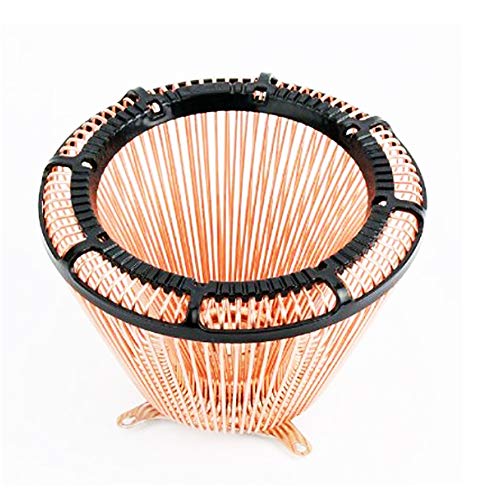
 Check Price
Check Price